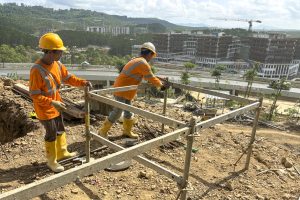Indonesian President Joko “Jokowi” Widodo yesterday began working from the presidential palace in his country’s new capital Nusantara, expressing satisfaction at the progress on the $32 billion project.
Speaking to reporters at the Garuda Palace, as the president’s new office will be known, Jokowi, said that he had received his first officials for meetings after spending Sunday night in the adjacent State Palace. He added that his first meeting yesterday would be with staff from the Nusantara Capital Authority, which is coordinating the gargantuan project.
To facilitate the move, the presidential secretariat is preparing all the necessary furniture for the presidential office, including tables, chairs and lighting,
“Today I have started receiving officials for meetings here, in the president’s office,” he told reporters, the Associated Press reported. “We came here to check the latest progress of the IKN, especially the construction of the palace, I see everything is still in process.” (IKN stands for Ibu Kota Nusantara, the official name for the new capital city project.) He added that the water, electricity, and internet is “all running well.”
Since 2022, the new Indonesian capital has slowly taken shape in the hills of East Kalimantan, some 1,300 kilometers from the current capital Jakarta, which is overcrowded, polluted, and rapidly sinking into the Java Sea. According to the OIKN, the capital will be a smart, green city that utilizes renewable energy sources and environmentally-friendly waste management. Construction on the city began in mid-2022.
The OIKN and thousands of workers are working double-time to complete Nusantara’s primary infrastructure in a bid to prepare it for Independence Day celebrations on August 17, which is slated to mark the official transfer of the capital city from Jakarta. Jokowi, whose second and final term ends in October, is hoping to spend his last few months in power working from the capital that he intends to stand as a concrete embodiment of his decade in power.
In recent months, Jokowi has been spending an increasing amount of time inaugurating buildings in Nusantara. On Sunday, Reuters reported, he “donned a black touring jacket and rode Nusantara’s new toll road on a motorcycle, flanked by several government officials and social media influencers.”
The Garuda Palace, which is named after a sweeping ornamental cover fashioned in the shape of a garuda, a mythical bird that also appears on the country’s coat of arms, will serve as the backdrop of the August 17 ceremony. The president’s official residence, which will officially known as the State Palace, is situated in the same complex. The Indonesian government has previously announced that it aims to relocate the first batch of 12,000 civil servants to the city in September.
The construction of the project has not been without its problems. Early last month, Bambang Susantono, the head of the OIKN, and his deputy Dhony Rahajoe had resigned their posts. While they did not state the reason for stepping down, their resignations added to perceptions that the project was in trouble, after months of construction delays, land procurement issues, and a lack of interest from foreign investors, which the government hopes will fund 80 percent of the project’s massive cost. This even gave rise to suggestions that the incoming President Prabowo may abandon or scale-down the project.
Talking to the media yesterday, Jokowi attempted to play down these fears, suggesting that the project was never going to be completed quickly. “This is a big job. It can take 10, 15, 20 years,” Jokowi said. “This is not a job that takes one or two years.”
Earlier this month, in a bid to lure both foreign and domestic investment, Jokowi signed a presidential regulation that grants investors a range of rights in the future capital, including land rights of up to 190 years.

































